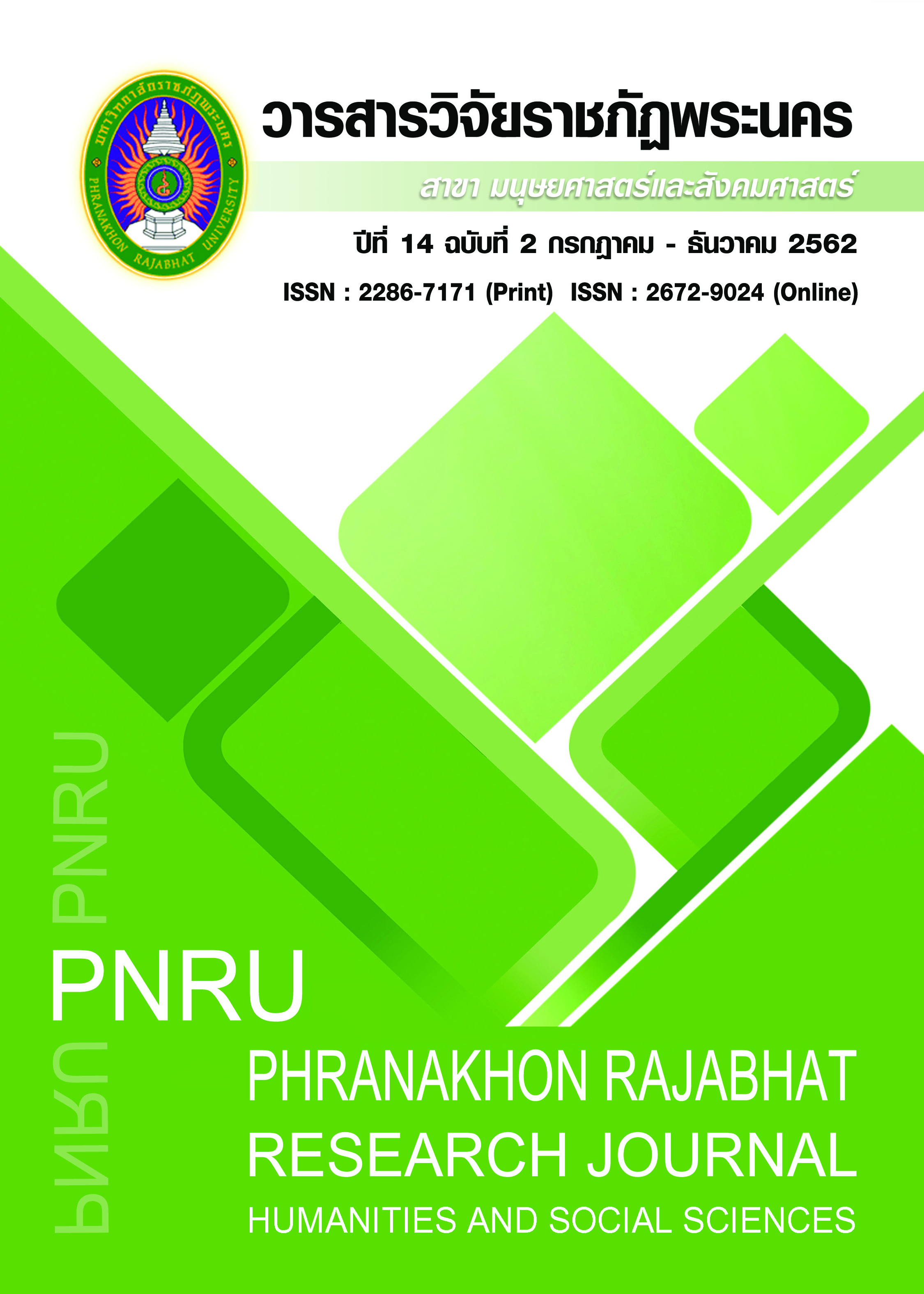ความสัมพันธ์ระหว่างกลวิธีการเรียนรู้เชิงอภิปัญญา กับผลสัมฤทธิ์ทางการเรียนรู้ภาษาญี่ปุ่นของนักเรียนมัธยมศึกษาตอนปลาย ในเขตกรุงเทพมหานคร
Main Article Content
บทคัดย่อ
งานวิจัยนี้มีวัตถุประสงค์ ได้แก่ 1) เพื่อศึกษาการใช้กลวิธีการเรียนรู้เชิงอภิปัญญาในการ เรียนรู้ภาษาญี่ปุ่นของนักเรียนมัธยมศึกษาตอนปลายในเขตกรุงเทพมหานคร และ 2) เพื่อวิเคราะห์ ความสัมพันธ์ระหว่างกลวิธีการเรียนรู้เชิงอภิปัญญากับผลสัมฤทธิ์ทางการเรียนรู้ภาษาญี่ปุ่นของ นักเรียนมัธยมศึกษาตอนปลายในเขตกรุงเทพมหานคร กลุ่มตัวอย่างของงานวิจัยนี้คือนักเรียน
ชั้นมัธยมศึกษาปีที่ 4 ที่กำลังศึกษาอยู่ในแผนการเรียนสายศิลป์-ภาษาญี่ปุ่นของโรงเรียนรัฐบาล ในสังกัดสำนักงานคณะกรรมการการศึกษาขั้นพื้นฐาน (สพฐ.) 11 โรงเรียนในเขตกรุงเทพมหานคร จำนวน 323 คน เก็บข้อมูลโดยการใช้แบบสอบถาม การสังเกตการณ์ในพื้นที่จริงอย่างมีส่วนร่วม รวมถึงการสัมภาษณ์ผู้เรียนกลุ่มตัวอย่าง สถิติที่นำมาใช้ในการวิเคราะห์ข้อมูล ได้แก่ ค่าร้อยละ ค่าเฉลี่ย ส่วนเบี่ยงเบนมาตรฐาน และค่าสัมประสิทธิ์สหสัมพันธ์เพียร์สัน ผลการวิจัยพบว่า ผู้เรียนกลุ่มตัวอย่างมีผลการเรียนภาษาญี่ปุ่นในระดับปานกลาง ( = 74.31) และใช้กลวิธีการเรียนรู้เชิงอภิปัญญาในระดับสูง ( = 3.61) ส่วนความสัมพันธ์ระหว่างกลวิธีการเรียนรู้เชิงอภิปัญญากับผลสัมฤทธิ์ทางการเรียนรู้ภาษาญี่ปุ่นของผู้เรียนกลุ่มตัวอย่าง อยู่ในระดับปานกลางอย่างมีนัยสำคัญทางสถิติที่ 0.01 (r = 0.44, p < 0.01) อาจเป็นด้วยเหตุผลที่ว่า กลวิธีการเรียนรู้เชิงอภิปัญญาเป็นกลวิธีที่มุ่งให้ผู้เรียนสำรวจและประเมินตนเองเป็นหลัก กระนั้นก็ตามกลุ่มตัวอย่างที่เป็นผู้เรียน ยังเป็นผู้เรียนภาษาญี่ปุ่นในระดับต้น จึงอาจต้องใช้กลวิธีการเรียนรู้อื่น ๆช่วยสนับสนุนการเรียนภาษาญี่ปุ่นด้วย
Article Details
บทความที่ได้รับการตีพิมพ์เป็นลิขสิทธิ์ของมหาวิทยาลัยราชภัฏพระนคร
ข้อความที่ปรากฏในบทความแต่ละเรื่องในวารสารวิจัยราชภัฏพระนครเล่มนี้เป็นความคิดเห็นส่วนตัวของผู้เขียนแต่ละท่านไม่เกี่ยวข้องกับมหาวิทยาลัยราชภัฏพระนคร และคณาจารย์ท่านอื่นๆในมหาวิทยาลัยฯ แต่อย่างใด ความรับผิดชอบองค์ประกอบทั้งหมดของบทความแต่ละเรื่องเป็นของผู้เขียนแต่ละท่าน หากมีความผิดพลาดใดๆ ผู้เขียนแต่ละท่านจะรับผิดชอบบทความของตนเองแต่ผู้เดียว
เอกสารอ้างอิง
Evans, J. D. (1996). Straightforward statistics for the behavioral sciences. CA: Brooks/Cole.
Fujita, Y. (2014). Effectiveness and challenges of classroom activities to enhance Japanese advanced level learners’ autonomy. Departmental Bulletin Paper. 8(10), 103-118. (in Japanese)
Hsiang, Y. F., Jin, J. F., & Hui, Z. Y. (2013). The relationship of learning motivation and achievement in EFL: gender as an intermediated variable. Educational Research International. 7(1), 21-40.
Japan Foundation. (2017). Search engine for institutions offering Japanese-language education. Retrieved September 30, 2017, from http://jpsurvey.net/jfsearch/do/index
Japan Foundation. (2017). Survey report on Japanese-language education abroad 2015. Tokyo: The Japan Foundation.
Klinkesorn, P. (2012). Japanese language learning strategies of Thai secondary students. Master of Arts Program in Japanese Studies. Faculty of Liberal Arts, Thammasat University. (in Thai)
National Institute of Educational Testing Service. (2016). NIETS’s announcement of the 2016 2nd GAT/PAT Score (March 5-8, 2016). Retrieved May 27, 2017, from http://www.niets.or.th/uploads/editor/files/GAT-PAT/ประกาศผลสอบGATPATครั้งที่ 2 2559 วันที่ 11 เมษายน 2559.pdf (in Thai).
National Institute of Educational Testing Service. (2017). The elementary statistical information of the 2017 1st GAT/PAT Score (October 29-November 1, 2016). Retrieved May 27, 2017, from http://www.niets.or.th/uploads/editor/files/GAT- PAT/ค่าสถิติพื้นฐาน และช่วงคะแนน GATPAT ครั้งที่ 1_2560.pdf (in Thai)
National Institute of Educational Testing Service. (2017). The elementary statistical information of the 2017 2nd GAT/PAT Score (March 11-14, 2017). Retrieved May 27, 2017, from http://www.niets.or.th/uploads/editor/files/GAT-PAT/ค่าสถิติพื้นฐานและ ช่วงคะแนน GATPAT ครั้งที่ 2_2560.pdf (in Thai)
Rubin, J. (1987). Learner Strategies: theoretical assumptions, research history and typology. In Wenden, A. & Rubin, J. (Eds.), Learner Strategies in Language Learning (pp.15-30). Hertfordshire: Prentice Hall International.
Tanthanis, T. (2013). Relationships among language learning strategies, language Learning motivation and English language proficiency. In Proceeding of the 51th Kasetsart University Annual Conference: Education, Economics and Business Administration, Humanities and Social Sciences (pp.161-169). Bangkok: Kasetsart
University. (in Thai)
Turan, S., Demiral, O., & Sayek, I. (2009). Metacognitive awareness and self-regulated learning skills of Medical students in different medical curricula. Medical Teacher. 31(10), 477-483.
Yamane, T. (1973). Statistics: an introductory analysis. 3rd edition. NY: Harper and Row.


